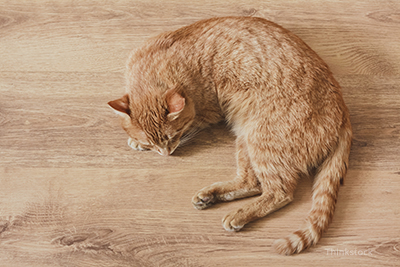
AJ Debiasse, a technician in Stroudsburg, PA, contributed to this article.
Did you know that cats can have a hyperactive thyroid gland? Also known as hyperthyroidism, it’s a fairly common condition in older cats. In fact, the vast majority of affected cats are older than 10 years of age. Most of the time, the reason is either a benign tumor or benign enlargement of the thyroid gland(s).
What is hyperthyroidism?
Hyperthyroidism is when thyroid glands work overtime and produce too much thyroid hormone. Because this hormone controls many organs, it can lead to multiple consequences:
- Weight loss, despite an increase in appetite
- Vomiting and/or diarrhea
- Irritable or aggressive behavior
- Increased drinking and urination
- Increased heart rate
- A heart murmur
- Poor hair coat
- Increased activity
Occasionally, a chubby couch potato kitty with gorgeous hair may turn into a skinny old cat with a rough hair coat, running around the house like a maniac.
How is hyperthyroidism diagnosed?
Since some of the signs of hyperthyroidism can be similar to other diseases, it’s important to perform a full work up. This starts with a thorough physical exam. A small nodule on the thyroid can often be felt by your veterinarian.
Blood work, including measurement of the thyroid hormone level, is the next logical step. The increased metabolic rate of hyperthyroidism can hide kidney issues and cause heart complications, so both should be monitored before and after treatment has been started. This requires blood work, X-rays and ultrasound.
How is hyperthyroidism treated?
There are several treatment options:
- Methimazole is a medication that fights hyperthyroidism. It is usually given by mouth, every single day. Methimazole can also be compounded into a cream which is applied to the skin or the ear daily (transdermal application).This is a life-long treatment.
- I know about at least one special diet that is very low in iodine, and was introduced a few years ago. If your veterinarian recommends this option, this is the only food your cat should eat for good results.
- Veterinary endocrinologists consider IV radioactive iodine treatment as the gold standard for hyperthyroidism.
- Surgery to remove the tumor is an option, although it is less and less common. It’s a delicate surgery but in good hands, it is highly successful.
What are the risks of thyroid surgery?
In addition to the risks of anesthesia [see common anesthesia myths here], one of the main risks of surgery is damage or accidental removal of the parathyroid glands. There are two parathyroid glands on each side: one inside each thyroid gland, and one just outside of each thyroid gland. When we remove the thyroid gland, we remove the “internal” parathyroid gland. If we remove both thyroid glands, then we remove both internal parathyroid glands. So there are only two external parathyroid glands left. If they are removed accidentally, along with a large thyroid mass, or if they are damaged during surgery, then three or even all four parathyroid glands might be removed.
As a consequence, the cat may have a complication called hypocalcemia, which means that the calcium levels in the blood stream are dangerously low.
What medications are needed after thyroid surgery?
Besides the usual pain medications and antibiotics, the hypocalcemia (low calcium) needs to be managed if it develops. This is typically done by giving calcium supplements and/or vitamin D. Their dosages are slowly tapered over time as the body slowly takes over. In addition, calcium is provided once the cat eats enough food.
What is the outcome of hyperthyroidism treatment?
Thyroid cancer (adenocarcinoma) is an aggressive tumor but thankfully very rare. The outcome for that is usually poor.
Benign tumors (adenomas) and benign enlargement of the thyroid gland are much more common and have a much better outcome. However, the outcome also depends on whether complications occur with the kidneys or the heart. Most cats live years after the initial diagnosis.
As with any disease, the sooner you address it, the more options you have and the better the outcome. If your cat is acting out of sorts in any way, please see your veterinarian as soon as possible.
Questions to ask your vet if your cat has a thyroid mass:
- What is the best treatment for my cat?
- What are the risks of anesthesia?
- What are the risks of surgery?
If you have any questions or concerns, you should always visit or call your veterinarian -- they are your best resource to ensure the health and well-being of your pets.
